Related Research Articles
Clive Staples Lewis was a British writer, literary scholar, and Anglican lay theologian. He held academic positions in English literature at both Magdalen College, Oxford (1925–1954), and Magdalene College, Cambridge (1954–1963). He is best known as the author of The Chronicles of Narnia, but he is also noted for his other works of fiction, such as The Screwtape Letters and The Space Trilogy, and for his non-fiction Christian apologetics, including Mere Christianity, Miracles, and The Problem of Pain.
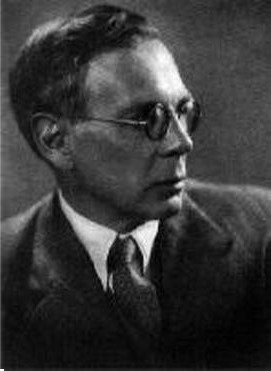
Charles Walter Stansby Williams was an English poet, novelist, playwright, theologian and literary critic. Most of his life was spent in London, where he was born, but in 1939 he moved to Oxford with the university press for which he worked and was buried there following his early death.

The Inklings were an informal literary discussion group associated with J. R. R. Tolkien and C. S. Lewis at the University of Oxford for nearly two decades between the early 1930s and late 1949. The Inklings were literary enthusiasts who praised the value of narrative in fiction and encouraged the writing of fantasy. The best-known, apart from Tolkien and Lewis, were Charles Williams, and Owen Barfield.
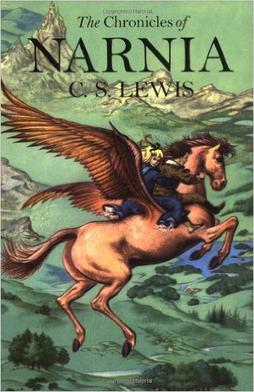
The Chronicles of Narnia is a series of seven portal fantasy novels by British author C. S. Lewis. Illustrated by Pauline Baynes and originally published between 1950 and 1956, the series is set in the fictional realm of Narnia, a fantasy world of magic, mythical beasts and talking animals. It narrates the adventures of various children who play central roles in the unfolding history of the Narnian world. Except in The Horse and His Boy, the protagonists are all children from the real world who are magically transported to Narnia, where they are sometimes called upon by the lion Aslan to protect Narnia from evil. The books span the entire history of Narnia, from its creation in The Magician's Nephew to its eventual destruction in The Last Battle.
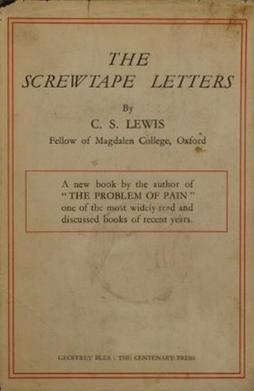
The Screwtape Letters is a Christian apologetic novel by C. S. Lewis and dedicated to J. R. R. Tolkien. It is written in a satirical, epistolary style and, while it is fictional in format, the plot and characters are used to address Christian theological issues, primarily those to do with temptation and resistance to it.
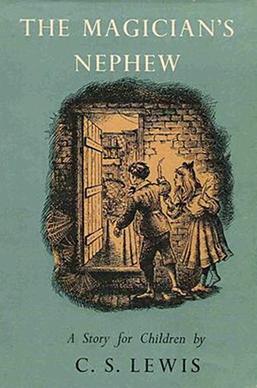
The Magician's Nephew is a portal fantasy children's novel by C. S. Lewis, published in 1955 by The Bodley Head. It is the sixth published of seven novels in The Chronicles of Narnia (1950–1956). In recent editions, which sequence the books according to Narnia history, it is volume one of the series. Like the others, it was illustrated by Pauline Baynes whose work has been retained in many later editions. The Bodley Head was a new publisher for The Chronicles, a change from Geoffrey Bles who had published the previous five novels.
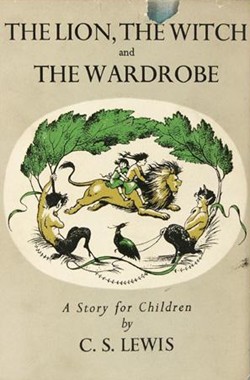
The Lion, the Witch and the Wardrobe is a portal fantasy novel for children by C. S. Lewis, published by Geoffrey Bles in 1950. It is the first published and best known of seven novels in The Chronicles of Narnia (1950–1956). Among all the author's books, it is also the most widely held in libraries. It was the first of The Chronicles of Narnia to be written and published, but is marked as volume two in recent editions that are sequenced according the stories' internal chronology. Like the other Chronicles, it was illustrated by Pauline Baynes, and her work has been retained in many later editions.
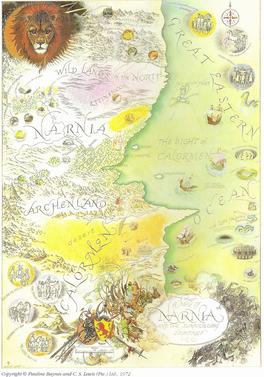
Narnia is a fantasy world created by C. S. Lewis as the primary location for his series of seven fantasy novels for children, The Chronicles of Narnia. The world is named after the country of Narnia, where much of the Chronicles takes place.

Oliver Wendell Holmes Sr. was an American physician, poet, and polymath based in Boston. Grouped among the fireside poets, he was acclaimed by his peers as one of the best writers of the day. His most famous prose works are the "Breakfast-Table" series, which began with The Autocrat of the Breakfast-Table (1858). He was also an important medical reformer. In addition to his work as an author and poet, Holmes also served as a physician, professor, lecturer, inventor, and, although he never practiced it, he received formal training in law.

Arthur Owen Barfield was an English philosopher, author, poet, critic, and member of the Inklings.
Walter McGehee Hooper was an American writer. He is best known as the editor of many posthumous books by C. S. Lewis, as the joint author of a biography of Lewis and as the literary advisor of Lewis's estate. He was also a literary trustee for Lewis's friend Owen Barfield from December 1997 until October 2006.

The Autocrat of the Breakfast-Table (1858) is a collection of essays written by Oliver Wendell Holmes Sr. The essays were originally published in The Atlantic Monthly in 1857 and 1858 before being collected in book form. The author had written two essays with the same name which were published in the earlier The New-England Magazine in November 1831 and February 1832, which are alluded to in a mention of an "interruption" at the start of the first essay.
Irving Singer was an American professor of philosophy who was on the faculty of the Massachusetts Institute of Technology for 55 years and wrote over 20 books. He was the author of books on various topics, including cinema, love, sexuality, and the philosophy of George Santayana. He also wrote on the subject of film, including writings about the work of film directors Ingmar Bergman, Alfred Hitchcock.
Derek Stanley Brewer was a Welsh medieval scholar, author and publisher.

Charles Bazerman is an American educator and scholar. He was born and raised in New York. He has contributed significantly to the establishment of writing as a research field, as evidenced by the collection of essays written by international scholars in Writing as A Human Activity: Implications and Applications of the Work of Charles Bazerman. Best known for his work on genre studies and the rhetoric of science, he is a Professor of Education at the University of California, Santa Barbara, where he also served as Chair of the Program in Education for eight years. He served as Chair of the Conference on College Composition and Communication, delivering the 2009 CCCC Chair's Address, "The Wonders of Writing," in San Francisco, California.
Joel D. Heck is a retired pastor and professor, formerly Executive Editor of Concordia University Press. He is the author or editor of sixteen books, most recently publishing No Ordinary People: Twenty-One Friendships of C. S. Lewis. He currently serves as Interim President of Concordia Lutheran Seminary in Edmonton, Alberta, Canada.
This is a list of writings by C. S. Lewis.
The Chronicles of Narnia is a series of seven fantasy novels for children written by C. S. Lewis. It is considered a classic of children's literature and is the author's best-known work, having sold over 100 million copies in 47 languages. The series borrows characters and ideas from Classical, Norse, Irish, Arthurian, Islamic, Jewish and Christian mythology. Of all the mythologies taken into consideration, the Christian one is the most fundamental for the Narnia series, due to the themes covered.

Michael D. Aeschliman is a professor Emeritus at Boston University and Curriculum Advisor to The American School in Switzerland (TASIS) Foundation Board.
In C. S. Lewis's series of children's books, The Chronicles of Narnia, the depictions of food evoke nostalgia for the simple pleasures missing during post World War II rationing in the United Kingdom, and act as a symbol of positive or negative spiritual nourishment. In Lewis's essay "On Three Ways of Writing for Children", he writes of the food imagery in his books: "I myself like eating and drinking, I put in what I would have liked to read when I was a child and what I still like reading now that I am in my fifties". Themes that literary scholars have identified include the dichotomy of wholesome versus magical foods, and food-as-temptation.
References
- ↑ "Curriculum Vitae," James Como website, accessed 29 July 2023.
- ↑ "Writing," James Como website, accessed 29 July 2023.